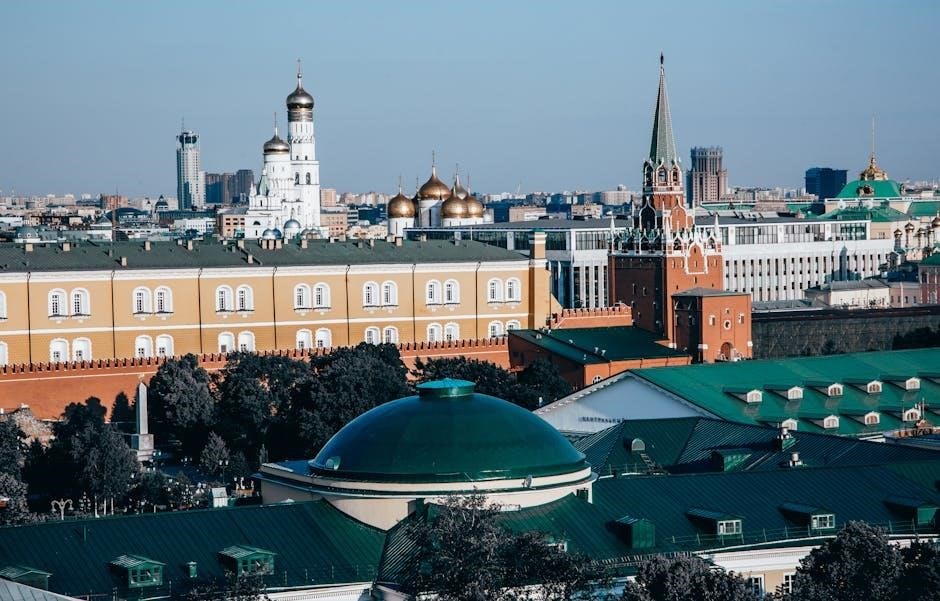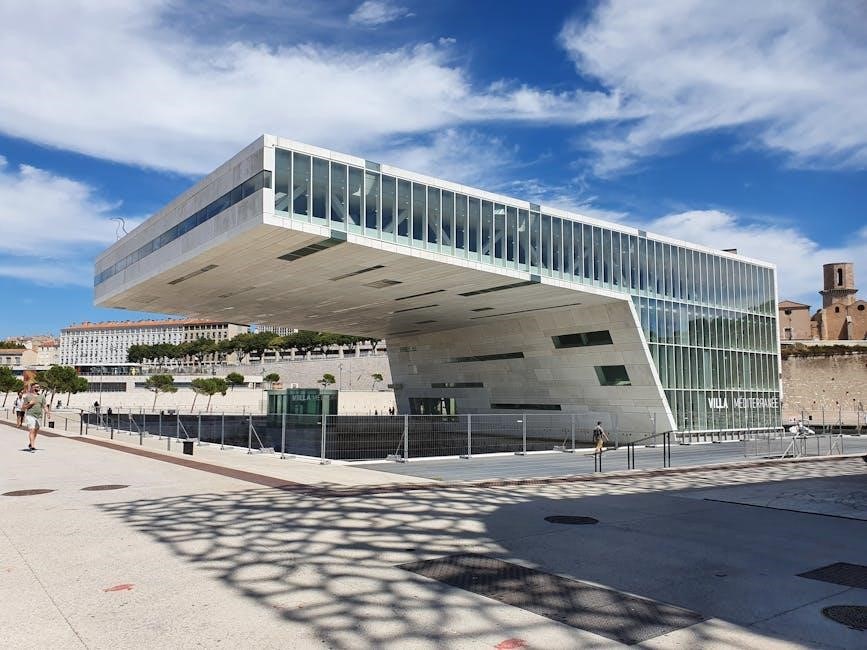Russia’s Mediterranean strategy reflects its growing geopolitical influence, combining economic, military, and cultural initiatives to strengthen its presence in the region, supported by energy exports and strategic alliances.
1.1 Historical Context of Russia’s Presence in the Mediterranean
Russia’s interest in the Mediterranean dates back centuries, driven by strategic and economic ambitions. Historical ties were strengthened during the 19th and 20th centuries, particularly through naval presence and support for regional allies. The Soviet Union further solidified its influence, using the Mediterranean as a counterbalance to Western powers. Post-Soviet Russia continued this trajectory, leveraging its military and diplomatic capabilities to maintain a foothold. Historical patterns reveal a consistent strategy of combining military presence with economic and cultural engagement to secure Russian interests in the region.
1.2 Key Objectives of Russia’s Mediterranean Policy
Russia’s Mediterranean policy aims to enhance its geopolitical influence, secure energy exports, and establish a strong military presence. Key objectives include strengthening strategic alliances with regional states, countering Western dominance, and advancing economic interests. Russia also seeks to promote cultural ties and expand its soft power in the region. Additionally, Moscow focuses on addressing security concerns, such as terrorism and instability, while ensuring access to critical maritime routes. These objectives reflect Russia’s broader strategy to position itself as a major global power with a significant foothold in the Mediterranean.
1.3 Significance of the Mediterranean for Russia’s Geopolitical Interests
The Mediterranean holds strategic importance for Russia as a gateway to Europe, Africa, and the Middle East, enabling influence over key trade routes and energy corridors. By strengthening its presence, Russia aims to counter Western dominance and secure access to vital markets and resources. The region’s proximity to critical chokepoints, such as the Suez Canal, enhances Russia’s ability to project power and protect its economic and military interests. Furthermore, the Mediterranean’s geopolitical significance aligns with Russia’s goal of expanding its global influence, ensuring energy security, and fostering strategic alliances that bolster its position as a major international actor.

Economic Ties Between Russia and the Mediterranean Region
Russia’s economic ties with the Mediterranean are driven by energy exports and trade agreements, supported by infrastructure investments and active participation of Russian companies in regional markets.
2.1 Energy Exports and Trade Agreements
Russia’s energy exports are a cornerstone of its Mediterranean strategy, with oil and natural gas shipments fueling economic ties. Trade agreements with Turkey, Algeria, and Egypt have strengthened these partnerships, ensuring stable energy supplies. The construction of pipelines, such as TurkStream, highlights Russia’s commitment to expanding its energy influence. These initiatives not only bolster Russia’s economy but also enhance its geopolitical standing in the region. Mediterranean countries benefit from reliable energy sources, fostering mutual economic growth and strategic alliances.
2;2 Investment in Infrastructure Projects
Russia has actively invested in infrastructure projects across the Mediterranean, strengthening economic ties and enhancing regional connectivity. Key initiatives include the development of ports, railways, and energy pipelines, such as the TurkStream project, which connects Russia to Turkey and beyond. These investments not only facilitate trade but also position Russia as a strategic partner in regional development. Additionally, collaborations in transportation and logistics projects have bolstered Russia’s presence, creating jobs and fostering economic growth in host countries. Such ventures underscore Russia’s commitment to building long-term partnerships and solidifying its influence in the Mediterranean region.
2.3 Role of Russian Companies in the Mediterranean Economy
Russian companies play a pivotal role in the Mediterranean economy, particularly in energy, construction, and telecommunications. Firms like Gazprom and Rosatom have secured significant contracts, driving economic growth and fostering partnerships. These investments not only strengthen Russia’s economic foothold but also enhance regional energy security and infrastructure development. By engaging in joint ventures and supplying advanced technologies, Russian enterprises contribute to the diversification of the Mediterranean economy. Their activities align with local development goals, creating mutual benefits and reinforcing Russia’s position as a key economic player in the region.
Military and Security Presence
Russia’s military presence in the Mediterranean underscores its strategic interests, with naval deployments and bases reinforcing its security objectives in the region.
3.1 Naval Deployments in the Mediterranean
Russia’s naval deployments in the Mediterranean are a cornerstone of its regional security strategy, showcasing its military capabilities and reinforcing its influence. The establishment of a permanent naval task force in the Mediterranean underscores Moscow’s commitment to maintaining a strategic maritime presence. These deployments are often linked to exercises and operations that demonstrate Russia’s ability to project power. The fleet’s activities, including anti-piracy missions and support for broader geopolitical objectives, highlight Russia’s role as a key player in regional security dynamics. This naval presence also enhances Russia’s ability to support allies and protect its interests in the Mediterranean, solidifying its position as a global maritime power.
3.2 Military Bases and Strategic Alliances
Russia’s military bases in the Mediterranean are pivotal to its strategic influence, with key installations in Syria, such as Tartus and Hmeimim, serving as hubs for operations. These bases enhance Russia’s ability to project power and support regional allies, fostering strategic alliances with nations like Syria and Algeria. By establishing a robust military presence, Russia strengthens its position in geopolitical disputes and ensures access to critical maritime routes. These alliances also facilitate joint exercises and defense cooperation, bolstering Russia’s role as a security provider in the Mediterranean. Such strategic engagements underscore Russia’s commitment to maintaining a strong foothold in the region.
3.3 Security Initiatives and Joint Exercises
Russia actively engages in security initiatives and joint military exercises in the Mediterranean, fostering cooperation with regional partners. These exercises often involve naval drills, counter-terrorism operations, and maritime security training, enhancing interoperability with countries like Algeria and Egypt. By participating in such initiatives, Russia strengthens its role as a regional security provider, addressing shared concerns such as piracy and illegal activities. These efforts also serve to project Russian influence and demonstrate its commitment to maintaining stability in the Mediterranean. Such collaborative activities underline Russia’s strategic approach to building trust and reinforcing its presence in the region through practical cooperation.
Cultural and Diplomatic Relations
Russia strengthens cultural ties with Mediterranean nations through educational exchanges, tourism initiatives, and joint cultural projects, fostering mutual understanding and diplomatic cooperation, while NGOs play a pivotal role.
4.1 Cultural Exchanges and Educational Programs
Russia actively promotes cultural exchanges and educational programs in the Mediterranean region, fostering mutual understanding and intellectual collaboration. These initiatives include scholarships, language courses, and joint academic projects, enabling students and scholars to explore shared cultural heritage. Russian universities collaborate with Mediterranean counterparts on research initiatives, enhancing cross-cultural dialogue. Such programs not only strengthen educational ties but also contribute to long-term people-to-people diplomacy, fostering a deeper appreciation of Russian culture in the Mediterranean and vice versa. These efforts play a significant role in building bridges between nations, promoting peace, and enriching the cultural fabric of both regions. They also highlight Russia’s commitment to cultural diplomacy as a tool for fostering global cooperation and understanding.
4.2 Tourism and People-to-People Diplomacy
Russia has actively promoted tourism as a cornerstone of its Mediterranean strategy, fostering people-to-people diplomacy. By encouraging mutual visa facilitation and cultural exchanges, Russia aims to strengthen ties with Mediterranean nations. Tourist flows between Russia and Mediterranean countries have increased, driven by shared historical and cultural heritage. Collaborative efforts in the tourism sector, such as joint travel initiatives and cross-promotion of destinations, have further deepened connections. These activities not only boost local economies but also serve as a platform for fostering mutual understanding and trust. By leveraging tourism as a diplomatic tool, Russia seeks to enhance its influence in the Mediterranean while creating lasting bonds with regional partners.
4.3 Role of NGOs and Cultural Institutions
Non-governmental organizations (NGOs) and cultural institutions play a vital role in fostering Russia’s cultural ties with the Mediterranean region. These entities facilitate cultural exchanges, educational programs, and joint initiatives, enhancing mutual understanding. NGOs often serve as bridges, organizing events that highlight shared heritage and contemporary practices. Cultural institutions, such as museums and libraries, collaborate on exhibitions and historical preservation projects. These efforts not only promote Russian culture in the Mediterranean but also strengthen people-to-people connections. By supporting such initiatives, Russia aims to build long-term partnerships and reinforce its cultural influence in the region, complementing its broader geopolitical and economic strategies.

Environmental and Energy Cooperation
Russia partners with Mediterranean countries on environmental initiatives, combating climate change, and renewable energy projects, aligning with global sustainability goals while advancing Moscow’s strategic interests in the region.
5.1 Joint Efforts in Combating Climate Change
Russia collaborates with Mediterranean nations on environmental initiatives, focusing on combating climate change through renewable energy projects and sustainable practices. These efforts align with global goals to reduce carbon emissions and promote eco-friendly technologies. Russia’s expertise in energy sectors supports joint ventures in solar and wind power, enhancing regional sustainability. Such cooperation not only addresses environmental challenges but also strengthens economic ties, fostering a greener future for the Mediterranean region while advancing Russia’s geopolitical objectives. These initiatives reflect a shared commitment to mitigating climate impacts and ensuring a sustainable environment for future generations.
5.2 Energy Cooperation and Renewable Energy Projects
Russia and Mediterranean countries are advancing energy cooperation, particularly in renewable energy projects. Solar and wind power initiatives are central to these partnerships, with Russia’s expertise in energy technology driving progress. Joint ventures, such as solar farms in Egypt and wind farms in Turkey, exemplify this collaboration. These projects not only diversify energy sources but also enhance regional energy security. Russia’s involvement aligns with its strategic interests while supporting Mediterranean nations in achieving sustainable development goals. Such initiatives foster mutual benefits, strengthening economic and environmental ties between Russia and the Mediterranean region.
5.3 Environmental Impact of Russian Activities
Russia’s activities in the Mediterranean have raised environmental concerns, particularly regarding energy exploration and naval operations. Oil and gas projects pose risks of spills and habitat disruption. Additionally, emissions from Russian ships contribute to marine pollution. Local communities and NGOs have expressed concerns over these environmental impacts. However, Russian companies are increasingly investing in renewable energy projects, such as solar and wind farms, to reduce their carbon footprint. These efforts aim to balance economic interests with environmental sustainability. Despite progress, continuous monitoring and international cooperation are essential to mitigate long-term ecological damage in the Mediterranean region.

Challenges and Controversies
Russia’s Mediterranean presence faces challenges, including environmental impact concerns and visa difficulties for its citizens, sparking debates on sustainability and diplomatic relations.
6.1 Political Tensions and Conflicts
Russia’s Mediterranean strategy has sparked political tensions, particularly with EU and NATO members, as its actions are seen as challenging Western influence. Regional conflicts, such as Syria, have intensified rivalries, while energy competition and diplomatic strains over visas and alliances further complicate relations. These tensions highlight Russia’s assertive geopolitical posture, provoking concerns among Mediterranean nations and international organizations.
6.2 Economic Competitions and Trade Disputes
Russia’s economic initiatives in the Mediterranean have led to competition with EU nations, particularly in energy exports and infrastructure investments. Trade disputes arise as EU countries seek to reduce dependence on Russian energy, impacting bilateral agreements. Additionally, Russian companies face challenges due to international sanctions, complicating economic engagements. These disputes underscore the region’s strategic importance and the balancing act nations must perform to maintain economic ties while addressing geopolitical tensions.
6.3 Environmental and Social Concerns
Russia’s Mediterranean activities have raised environmental concerns, particularly regarding energy projects and maritime pollution. Local ecosystems face risks from oil spills and increased ship traffic. Socially, large-scale infrastructure investments sometimes displace communities, sparking tensions. NGOs criticize Russian projects for prioritizing economic gains over sustainability. Additionally, labor practices in Russian-funded initiatives have drawn scrutiny, with allegations of exploiting local workers. These issues highlight the need for stricter environmental regulations and social safeguards to balance economic development with ecological and human well-being in the region.

Future Prospects and Opportunities
Russia’s Mediterranean strategy may expand through enhanced economic partnerships, strategic alliances, and environmental cooperation, offering opportunities for mutual growth and stability in the region.
7.1 Expanding Economic Partnerships
Russia aims to strengthen its economic ties with Mediterranean nations through increased energy exports, trade agreements, and investments in infrastructure. By leveraging its energy resources, Russia can enhance its role as a reliable supplier, fostering long-term partnerships. Trade agreements could reduce tariffs and expand market access for Russian goods, while Mediterranean countries could offer agricultural products and advanced technologies. Additionally, investments in ports and transportation networks could bolster regional connectivity, creating mutual economic benefits. Russian companies are also poised to play a key role in these partnerships, driving innovation and collaboration in sectors like renewable energy and technology. This cooperation could pave the way for sustainable growth and shared prosperity.
7.2 Strengthening Security Cooperation
Russia is actively seeking to bolster security cooperation with Mediterranean nations, focusing on counter-terrorism, maritime security, and regional stability. Joint military exercises and intelligence-sharing initiatives are key components of this strategy, aimed at addressing shared threats. By enhancing coordination, Russia and Mediterranean countries can more effectively combat piracy, illegal trafficking, and other security challenges. This cooperation also extends to addressing the root causes of instability, such as political tensions and socio-economic disparities. Strengthening these partnerships not only benefits regional security but also aligns with Russia’s broader geopolitical goals, fostering trust and collaboration in a volatile region. Mutual security interests drive this growing alliance.
7.3 Enhancing Cultural and Educational Ties
Russia is actively fostering cultural and educational exchanges with Mediterranean countries to deepen mutual understanding and collaboration. Initiatives include scholarships for Mediterranean students, joint academic research projects, and language programs promoting Russian and Mediterranean languages. Cultural events, such as film festivals and art exhibitions, highlight shared heritage and diversity. NGOs and cultural institutions play a pivotal role in organizing these activities, strengthening people-to-people diplomacy. These efforts not only enrich cultural landscapes but also create a foundation for long-term cooperation, fostering trust and intellectual exchange between Russia and Mediterranean nations. Such ties are essential for sustainable partnerships in education, arts, and cultural preservation.

Regional Impact and Global Implications
Russia’s Mediterranean strategy influences regional stability and global geopolitics, shaping power dynamics and fostering international collaborations, while addressing security and economic challenges.
8.1 Influence on Regional Stability
Russia’s Mediterranean strategy significantly impacts regional stability, balancing power dynamics and fostering security through naval deployments and strategic alliances. Its energy exports and economic partnerships strengthen ties, promoting interdependence. Cultural exchanges enhance mutual understanding, countering tensions. However, competition with other global powers risks destabilization, requiring careful diplomacy to maintain balance and cooperation in the region.
8.2 Implications for Global Geopolitics
Russia’s Mediterranean strategy has profound implications for global geopolitics, positioning it as a key player in international relations. By countering Western influence and strengthening ties with Mediterranean nations, Russia enhances its global standing. This strategic move impacts power balances, influencing alliances and shaping international policies. The expansion of Russian influence in energy and security sectors underscores its role in global governance, affecting relations with Europe, the Middle East, and beyond. This shift in geopolitical dynamics highlights Russia’s efforts to assert itself as a major power, reshaping the global political landscape and challenging existing power structures.
8.3 Role of International Organizations
International organizations play a pivotal role in shaping Russia’s Mediterranean strategy by fostering cooperation and addressing regional challenges. The EU, NATO, and regional bodies like the Union for the Mediterranean facilitate dialogue and collaboration. These organizations promote stability, economic integration, and environmental sustainability, influencing Russia’s engagement in the region. They also provide platforms for conflict resolution and multilateral initiatives, enabling Russia to align its interests with broader global agendas. The involvement of these entities underscores the interconnected nature of geopolitical strategies, emphasizing the importance of collective action in achieving regional and global objectives.
Russia’s Mediterranean strategy underscores its geopolitical influence, blending economic, military, and cultural initiatives to enhance its regional presence while addressing global implications through strategic integration and cooperation.
9.1 Summary of Key Findings
Russia’s Mediterranean strategy highlights its efforts to establish itself as a key geopolitical player, leveraging military deployments, economic partnerships, and cultural diplomacy. Energy exports and strategic alliances strengthen its influence, while cultural exchanges and educational programs foster soft power. NGOs and cultural institutions further enhance Russia’s regional presence. However, challenges such as political tensions and environmental concerns persist, requiring balanced approaches. Sustained engagement in the Mediterranean remains crucial for Russia to maintain stability and expand its global influence.
9.2 Recommendations for Future Engagement
Russia should expand economic partnerships through enhanced trade agreements and investments in renewable energy projects. Strengthening security cooperation with Mediterranean nations and international organizations will foster regional stability. Cultural and educational exchanges should be prioritized to deepen mutual understanding. Addressing environmental concerns and ensuring transparency in activities will build trust. Diversifying energy exports and exploring joint infrastructure ventures can bolster economic ties. Encouraging dialogue to resolve political tensions and promoting collaborative initiatives will enhance Russia’s long-term influence in the Mediterranean, ensuring a balanced and sustainable approach to its strategic goals.
9.3 Final Thoughts on Russia’s Mediterranean Strategy
Russia’s Mediterranean strategy underscores its ambition to expand influence beyond traditional spheres, blending economic, military, and cultural efforts. While challenges like political tensions and environmental concerns persist, opportunities for cooperation remain vast. Balancing strategic interests with regional stability will be crucial. Russia must address environmental impacts and foster transparency to enhance trust. By prioritizing collaborative initiatives and fostering dialogue, Russia can navigate complexities and secure its position as a key Mediterranean player, ensuring long-term relevance in a dynamic geopolitical landscape.



